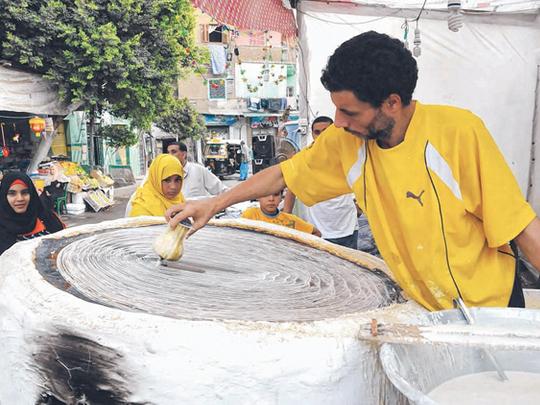
Cairo The vocation has always been in his family, but Khalid Abdul Fatah is not sure if he can pass it on to one of his three children.
In the run-up to Ramadan, Abdul Fatah, originally the owner of a small gift shop in northern Cairo, prepared his tools for his seasonal trade: making kunafa, a sweet vermicelli that is popular with Egyptians during this lunar month.
"I build a brick oven coated with a distinguished white paint. I also clean well my utensils, including a metal basin and a can," Abdul Fatah told Gulf News.
Elaborately kneaded
He makes and sells baladi kunafa, made manually. "This type of kunafa is made manually by putting elaborately kneaded flour inside the metal can, which has holes at the bottom. Then I skilfully move the can to allow threads of the dough to drop in circles over the hot surface of the oven."
Abdul Fatah says that the manually cooked kunafa is tastier than the one produced mechanically. "My customers from the old generation enjoy watching me while I make kunafa with my hands. This reminds them of the good old days. Unfortunately, machines are invading everything, including the kunafa industry," he said pensively. "They threaten to make the baladi kunafa a matter of the past."
Egyptians usually buy kunafa and stuff it with sugar and nuts before baking the mix and sprinkling it with syrup to serve as a hot dessert on the evenings of Ramadan.
Abdul Fatah believes that kunafa in Ramadan began to be made in Egypt in AD972, when people of Cairo took to the streets in the evening to welcome the arrival of their new Fatimid ruler Al Moez Lidin-Allah.
"They welcomed him with gifts, including delicious kunafa dishes. From then on, it has become the favourite dessert of the ruling elite as well as the common people." The Fatimids, who descended from Fatima, the daughter of Prophet Mohammad [PBUH), ruled Egypt for nearly two centuries.
A recent shortage of wheat, triggered by a Russian ban on exports, has raised worries in Egypt, the world's biggest wheat importer.
"This crisis has sent prices of flour rising in Egypt. Consequently, the price of kunafa has increased from 6 Egyptian pounds [Dh3.6] per kilo to 8 pounds. This increase has forced people, especially those living on limited incomes, to reduce their purchases," Abdul Fatah said.












